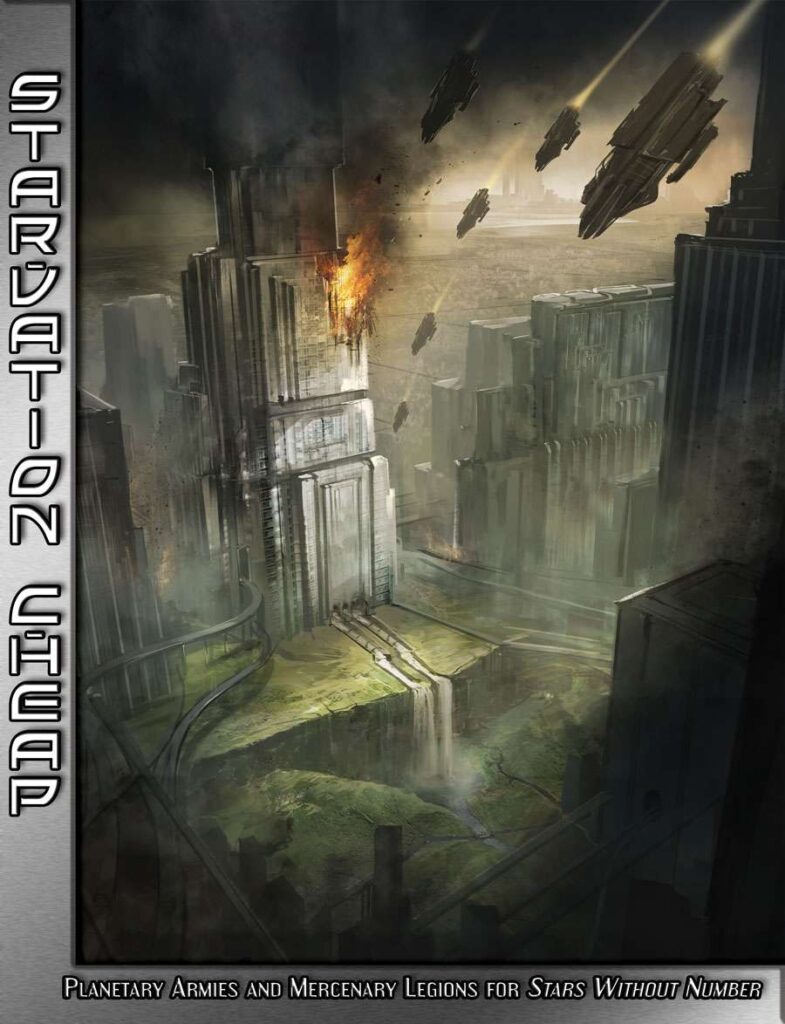Publisher: Sine Nomine Publishing
Introduction
Starvation Cheap is a sourcebook for Stars Without Number, a sci-fi roleplaying game by Kevin Crawford. It provides tools and guidelines for creating and running military campaigns in a science fiction setting. Whether you want to play as soldiers, mercenaries, rebels, or spies, Starvation Cheap offers a wealth of options and inspiration for your adventures.
Content
Starvation Cheap is divided into six chapters, each covering a different aspect of sci-fi warfare.
- Chapter 1: The Art of War. This chapter gives an overview of the types and causes of wars, the factions and forces involved, and the effects of war on society and culture. It also introduces some new rules and mechanics for Stars Without Number, such as morale, attrition, and reputation.
- Chapter 2: The Face of Battle. This chapter focuses on the tactical and operational level of war, providing guidelines for creating missions, objectives, battlefields, and enemies. It also presents some new combat options and equipment for Stars Without Number, such as artillery, air support, cyberwarfare, and mechs.
- Chapter 3: The Sinews of War. This chapter deals with the logistical and strategic level of war, offering tools for managing resources, supplies, transportation, and intelligence. It also features some new systems and assets for Stars Without Number, such as bases, fortifications, satellites, and nukes.
- Chapter 4: The Seeds of War. This chapter explores the origins and motivations of wars, giving advice on how to create compelling conflicts and adversaries for your campaign. It also showcases some sample factions and worlds that can serve as examples or starting points for your own creations.
- Chapter 5: The Spoils of War. This chapter examines the aftermath and consequences of wars, suggesting ways to handle rewards, repercussions, and resolutions for your campaign. It also includes some new perks and problems for Stars Without Number, such as medals, scars, PTSD, and war crimes.
- Chapter 6: The Echoes of War. This chapter presents four ready-made campaign frameworks that you can use or adapt for your own games. Each framework has a different theme and tone, ranging from gritty realism to epic space opera.
Quality
Starvation Cheap is a well-written and well-designed book that delivers on its promise of providing a comprehensive guide for sci-fi military campaigns. The book is full of useful information, advice, and examples that can help you create engaging and immersive scenarios for your players. The book is also compatible with other Stars Without Number supplements, such as Skyward Steel (naval warfare) and Polychrome (cyberpunk), allowing you to mix and match elements from different genres.
The book’s layout is clear and easy to read, with plenty of illustrations, tables, charts, and maps to enhance the presentation. The book’s tone is serious but not grimdark, balancing realism with fun. The book’s style is concise but not dry, conveying a lot of information without being boring.
The only minor flaw I can find in the book is that some of the rules and mechanics are scattered throughout the chapters, making it hard to find them quickly when needed. A summary or index at the end of the book would have been helpful.
Conclusion
Starvation Cheap is an excellent sourcebook for Stars Without Number that deserves a place in any sci-fi gamer’s library. It is a must-have for anyone who wants to run or play in a military campaign in a science fiction setting. It is also a great resource for anyone who wants to learn more about the art and science of war in general.
I highly recommend Starvation Cheap to anyone who enjoys sci-fi roleplaying games. It is one of the best books I have ever read on the topic of sci-fi warfare.
Starvation Cheap: Military Campaigns for Stars Without Number on DrivethruRpg
